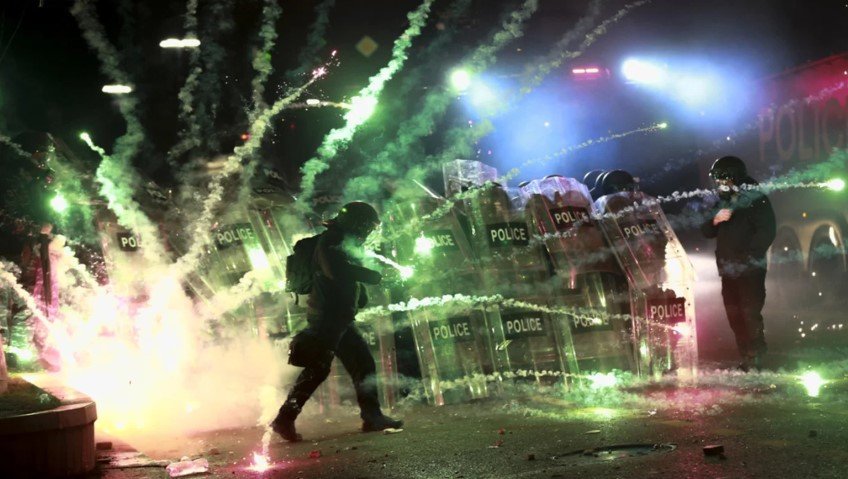Protests Against EU Accession Suspension Continue Amid Escalating Police Action
In Tbilisi, Georgia, police have once again moved to disperse thousands of protesters rallying against the government’s decision to suspend negotiations for European Union membership. The latest round of unrest comes after four consecutive nights of demonstrations, which have seen over 200 people detained. These protests began following the announcement from the ruling Georgian Dream party, which declared that talks on joining the EU would be put on hold.
The protests, initially sparked by the suspension of the EU negotiations, have now expanded into broader opposition to the ruling party’s handling of the country’s political future. This movement gained further momentum after the highly disputed results of Georgia’s October 26 parliamentary election. The Georgian Dream party’s victory has been widely criticized, with allegations of electoral fraud and claims that the ruling party received backing from Moscow. This controversy has fueled the pro-Western opposition and the country’s president, both of whom have vehemently opposed the government’s stance on EU accession.
Police Crackdown: Water Cannons and Tear Gas Used Against Protesters
The protests, which have been taking place outside the parliament building in Tbilisi, saw another violent escalation on Monday when police used water cannons and tear gas to disperse the crowds. These measures came after tensions had already reached a boiling point over the weekend, as demonstrators vented their anger against the Georgian Dream party’s suspension of EU talks. The opposition sees the move as a major setback for Georgia’s hopes of securing a place within the European Union.

The protests are not only a reflection of growing discontent with the government’s EU policies but also signal a wider dissatisfaction with the political direction of the country. As the situation continues to unfold, the Georgian government faces increasing pressure to resolve the crisis and address the concerns of both the opposition and a significant portion of the public that believes the suspension of EU talks represents a betrayal of Georgia’s European aspirations.
Detentions and Casualties: Rising Tensions Between Police and Protesters
According to the Georgian Interior Ministry, 224 protesters have been detained so far during the past few days of unrest. Among these, three individuals have been arrested on criminal charges, while the others face administrative penalties. The mass detentions are a clear indication of the government’s heavy-handed approach in dealing with the demonstrations.
In addition to the detentions, clashes between protesters and police have led to significant injuries. At least 113 police officers required medical treatment, with three hospitalized after being injured during the confrontations. Demonstrators have reportedly thrown fireworks and other projectiles at law enforcement officers, escalating the violence.
This tension-filled situation marks a troubling chapter for Georgia, which has long positioned itself as a pro-Western nation in the face of pressure from neighboring Russia. With the EU accession talks now suspended and mounting opposition from both inside and outside the country, Georgia’s political future remains uncertain.
Political Fallout: Opposition Boycotts and Accusations of Fraud
The ongoing unrest in Georgia is closely linked to the broader political situation, particularly the results of the October parliamentary elections. The opposition has refused to acknowledge the legitimacy of the Georgian Dream party’s victory, accusing them of election fraud and collusion with Moscow. These allegations have been fueled by the government’s decision to pause the EU talks, which many see as a direct betrayal of Georgia’s European ambitions.
In response, opposition leaders have continued their boycott of the Georgian parliament, calling for new elections and demanding accountability for the alleged election rigging. Protests have spread beyond the capital, with demonstrations taking place in other cities as well. The opposition, along with Georgia’s pro-Western president, argues that the ruling party is steering the country away from its European path, towards closer ties with Russia.
The situation is complicated further by Georgia’s unique geopolitical position. While the government has historically maintained a balance between the West and Russia, the current crisis has exposed deep divisions within Georgian society, with many citizens frustrated by the political establishment’s inability to make decisive progress on EU integration.
International Response and Growing Concerns
As the protests continue, the international community has expressed concern over the escalating violence and the treatment of protesters. The United Nations and various human rights organizations have condemned the use of excessive force by Georgian police, calling for greater respect for freedom of assembly and expression.
Human rights advocates have also highlighted the importance of protecting journalists, many of whom have been caught in the crossfire while covering the protests. The media’s role in documenting and reporting on the unrest is crucial, yet journalists have faced increasing threats and attacks, raising alarms about the state of press freedom in Georgia.
As tensions mount and more arrests occur, the global community will be watching closely to see how the Georgian government handles this crisis and whether it can de-escalate the situation without further compromising its international standing.
